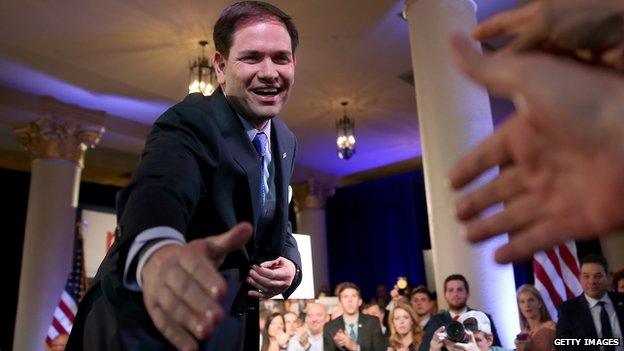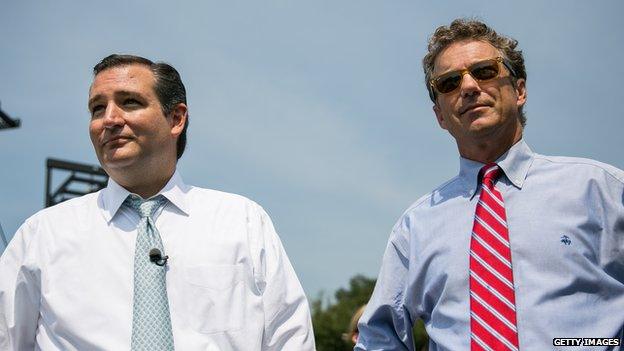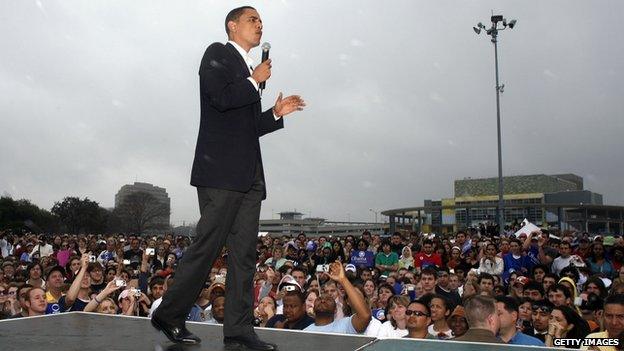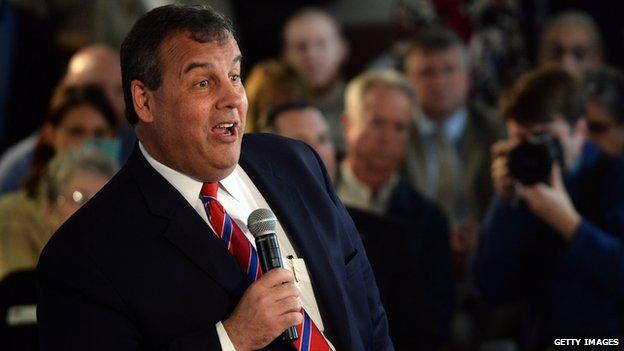Three Republican 'colonels' plot their coup
- Published
The 2016 Republicans: a message mash-up (video by David Botti)
It's almost always the colonels who lead the coups.
They're usually young, hungry and oh-so-close to holding the reins of power, if only those pesky generals weren't in the way, external.
The US isn't big on military putsches, but in the past month the Republican Party has witnessed a political equivalent, as three Republican "colonels" - first-term senators with little establishment authority but lots of ambition - made their moves for the White House.
Ted Cruz, Rand Paul and Marco Rubio may be junior players in congressional chambers but Republican politics, and US electioneering in general, have changed in the past eight years - and all three sniff the opportunity to strike for the top prize.
"I have heard some suggest that I should step aside and wait my turn," Mr Rubio said in his announcement speech, external. "But I cannot. Because I believe our very identity as an exceptional nation is at stake, and I can make a difference as president."

It's a bold statement by a man who just five years ago was a little-known Florida state legislator. Mr Paul of Kentucky also was first elected in 2010, while Mr Cruz won in 2012.
All three were considered afterthoughts when they launched their Senate bids. They had support from the grass-roots Tea Party wing of the Republican Party, but the Republican establishment was squarely behind other, more tested politicians in the primaries.
Mr Rubio took aim at the Senate when he stood at 3% in the polls, and his opponent was the incumbent Florida governor. Mr Paul faced a candidate handpicked by the Republican leader in the US Senate, Kentucky's Mitch McConnell.
Mr Cruz had perhaps the most daunting task, as his primary field included the sitting Texas lieutenant governor - arguably the most powerful political figure in the state and, with a personal wealth of more than $200m (£133m), also one of the richest.
Both Mr Cruz and Mr Paul had never held elective office before their seemingly Quixotic runs. But all three insurgent candidates prevailed, their victories a reflection of the growing power of the Tea Party in Republican politics. It proved that candidates with the strongest party ties and most influential connections were no longer shoo-ins for their party's nod.

Senator Marco Rubio says he won't "wait his turn" to run for president
Once they arrived in Congress, all three men built national followings. Both Mr Cruz and Mr Paul made headlines for endurance-testing Senate filibusters - where they stood and spoke for hours to protest against what they saw as harmful policies.
Mr Cruz - who became a thorn in the side of the Republican congressional leadership - railed against continued funding of the Democratic healthcare reform programme, eventually leading to a backbench insurrection that shut down the federal government. Mr Paul called for the Obama administration to renounce the use of militarised drones in US airspace.
Mr Rubio also had his moment in the limelight, sponsoring 2013 Senate immigration legislation that included a pathway to citizenship for undocumented US residents. The reform efforts died in the House, however, when grass-roots conservatives turned on their former champion, insisting on increased border security over normalising the status of immigrants.
There's an old saying in US politics that every senator looks in the mirror and sees a president. The difference this time is that these three junior senators had the gumption to act on that desire.
An easy conclusion to draw is that their ambition stems from the success of another first-term senator who took on his party's establishment eight years ago.
But are comparisons between Barack Obama and the Republican senatorial threesome on the money? Many journalists seem to think so.
Mr Cruz "might be the conservative Barack Obama," writes, external the National Review's Jonah Goldberg.

Ted Cruz (left) and Rand Paul both led high-profile Senate filibusters
Mr Paul has "an agenda for change far more revolutionary than then-Senator Barack Obama did in the 2008 race, but one that is based on an identical strategy", says, external Slate's John Dickerson.
Mr Rubio's "personal and family story, his fast rise to national prominence and even his speech Monday echo the political story of President Obama," writes, external Dan Balz in the Washington Post.
Mr Obama won, in part, because he built an insurgent coalition of previously unengaged youth and minority voters within the Democratic Party. The Republican senators seemingly hope to do the same - as the pageantry and process of their campaign announcements reveal.
Mr Cruz spoke to a packed auditorium, external at Liberty College, a religious school in central Virginia. He aims to be the voice of disaffected evangelical conservatives. Mr Paul's announcement - in a Louisville hotel ballroom - was big on anti-Washington rhetoric and personal liberty, and his crowd was a diverse mix of Kentucky Republicans and younger supporters concerned about privacy issues and the growing government security state.
At his announcement in a building that holds particular symbolism for Miami's Cuban community, Mr Rubio spoke about immigrants, blue-collar workers and struggling families - constituencies that have drifted away from Republicans in the past few presidential elections.
None of the three has stirred the kind of passion that Mr Obama did in the run-up to the 2008 election, of course. Shortly after he announced his presidential candidacy, the then-Illinois senator attracted a crowd of 20,000 to a rally he held in Austin, Texas.

An estimated crowd of 20,000 turns out to see Barack Obama in 2007
But while they don't have Mr Obama's eye-popping turnouts, they can count on something perhaps more important to a serious presidential bid - dollars in the bank, and the prospect of more in the offing.
Thanks to changes in campaign financing over the past eight years, the political playing field has been fundamentally altered - even for a Republican Party that has traditionally rewarded service and seniority with its top-of-the-ticket nod.
As Mr Obama demonstrated in both his presidential races, the internet has made grass-roots fundraising possible on never-before-imagined levels. In 2012 his campaign raised $504m, external through email, social media and the Obama for President website.
And thanks to the US Supreme Court's Citizens United decision, external, a veritable geyser of cash has begun flowing from the super-wealthy into supposedly unaffiliated political action committees (PACs), which can provide a reliable bankroll for whichever candidate catches their fancy.

New Jersey Governor Chris Christie says the US hasn't "done well" with a first-term senator as president
Grass-roots funding will fuel Mr Paul's presidential campaign, as it did, external two successive races by his father, Ron Paul, in 2008 and 2012. Mr Rubio and Mr Cruz will reap the rewards of deep-pocketed benefactors.
The Florida senator, for instance, has support, external - to the tune of $10m - from auto magnate Norman Braman, the former owner of the Philadelphia Eagles American football franchise. Mr Cruz already has the backing, external of hedge fund billionaire Robert Mercer, who is reportedly helping to pour upwards of $31m into PACs supporting the Texan.
The presence of the three senators in the presidential field does present some challenges for Republican activists who have spent the better part of eight years deriding what they see as Mr Obama's thin pre-presidential resume, however.
"Republicans have said the nation made a mistake electing a one-term senator the president of the United States," Erick Erickson of RedState blog hypothetically asks, external the three candidates. "Why should you, a one-term senator, be the GOP's nominee?"
It's a line of attack some other prospective Republican candidates are picking up on.
"I don't believe we've done well with the experiment of a one-term senator being president of the United States," New Jersey Governor Chris Christie said, external in a television interview on Thursday.
For the moment, however, Mr Cruz and Mr Paul are faring significantly better, external than Mr Christie in Republican opinion polls, particularly in key early voting states - and Mr Rubio has a cache of favourable opinion that may be translating into a surge in support, external.
If Republican voters have a problem with the presidential aspirations of youthful senators, they haven't expressed it yet.
Establishment "generals" like former Florida Governor Jeb Bush still have the upper hand in terms of political support and financial backing. But as the three senators demonstrated when they made their upstart entrance on the national stage, status and power can hide vulnerability.
That's why coups work.
Republicans in (and out) of the presidential race
